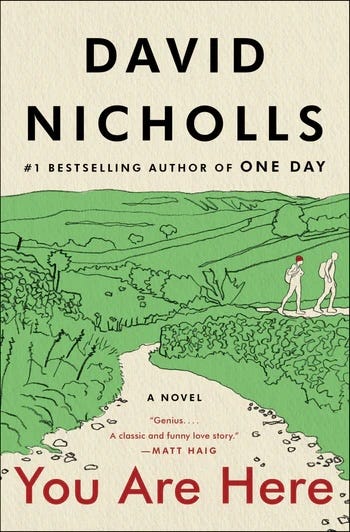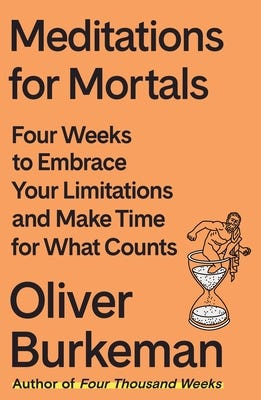You Are Here, by David Nicholls
After a string of fat summer novels, I hit a bit of a fiction slump this fall. This book got me out of my funk. It’s the story of two middle-aged adults, both knocked around by life, who meet while on a days-long hike across England. Michael is a geography teacher who loves to announce facts about his surroundings to anyone within earshot. To avoid his house, which seems painfully empty since his wife moved out, he spends his weekends and holidays on solitary walks. Marnie, a freelance copy editor in London, is divorced, and has realized she’s let all her friends drift away. She’s determined to shake up her lonely life, because while she’s “become addicted to the buzz of the cancelled plan,” she realizes she’s “not an introvert, just an extrovert who had lost the knack.” As Michael and Marnie tramp through the countryside and other members of their hiking party depart, they chat, and start to wonder if their rough edges might be compatible. This is a funny, moving and lovely read.
Meditations for Mortals, by Oliver Burkeman
Burkeman’s previous book, “Four Thousand Weeks”, put forth the terrifying/liberating idea that we have limited time in this life, and that attempting to perfectly maximize it is useless. This follow-up moves beyond our fruitless attempts at controlling time to our fruitless attempts at controlling all the frustrating aspects of our personalities and circumstances. “This is a book about how the world opens up once you realize you’re never going to sort your life out,” Burkeman writes. Once you really grasp that idea, he writes, you are free to actually do the rewarding stuff of daily living. The book is structured to be read one short chapter at a time, for 28 days. (I binged it, but am planning to go back and reread it as intended.) I highlighted a lot of passages that are relevant to my own perceived shortcomings: endless worrying over things that may or may not happen, the belief that meaningful accomplishment always requires 100% effort, a lack of self-compassion, and a self-imposed responsibility for other people’s emotions. As with all service/self-help books, Burkeman’s tone and approach may not click for you, but I found his approach bracing and truly useful.
How Can I Help You, by Laura Sims
This is a spiky, quick thriller set in a small-town library. Margo has been working there for two years, and she’s loving the “deep, abiding quiet, and the sense that the outside world couldn’t reach me” even though she doesn’t like to read. (“Readers aren’t doers, are they?”) Margo has good reason to seek safe harbor; she fled her previous life as a nurse amid suspicions that her ICU patients were dying at a higher-than-average rate. After changing her name and appearance, she’s settled into a routine that’s disrupted by the appearance of a new hire, reference librarian Patricia. The library is also a refuge for Patricia, who left her boyfriend back in Chicago and her unsold novel in a locked desk drawer. She’s determined not to write anymore, and to focus on her new job. But when she witnesses a charged encounter between Margo and a library patron, she starts to take notes on what she sees, and then befriends Margo to get more material. Both of these women are unhealthily obsessed, and reading how that plays out is both disturbing and a lot of fun.






Nice work. Keep it rolling.
Thanks for reminding me about You Are Here. It’s on my TBR but I completely forgot to read it. The other two books sounds great as well. Love your recs.